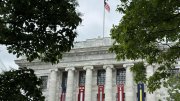Harvard Medical School announced changes to its diversity programming last week, renaming its diversity office and saying it plans to revamp an initiative that recruits medical students from underserved communities.
The move is the latest in a series of shifts to diversity efforts across the University, as Harvard faces increasing pressure from the federal government to dismantle its diversity, equity, and inclusion (DEI) programs. In April, Harvard rebranded its central Office for Equity, Diversity, Inclusion, and Belonging as the Office for Community and Campus Life and said it would stop funding affinity graduation celebrations—decisions that drew sharp criticism from some students and observers.
In a message to the HMS community last week, Dean George Q. Daley announced that the school’s Office for Diversity Inclusion and Community Partnership will now be called the Office for Culture and Community Engagement. He also said the Office of Recruitment and Multicultural Affairs would be absorbed into the Office of Student Affairs. The recruitment office was founded over 50 years ago by HMS professor Alvin F. Poussaint to recruit students from underserved communities and help them succeed in medical school.
Web pages for both the former diversity office and the recruitment program now display placeholder text. The culture and community engagement office page says it “will continue to update this space over the next few weeks.” Meanwhile, the recruitment office page says it is being updated “to reflect the evolving work of our offices and programs,” with a relaunch expected this fall.
“I hope it is abundantly clear that while we continue to adapt to the ever-evolving national landscape, Harvard Medical School’s longstanding commitment to culture and community will never waver,” Daley wrote in a message announcing the changes to the medical school community last Wednesday.
In his description of the former diversity office’s charge, Daley made no mention of race or identity. The “two main aims,” he wrote, are to “provide support to individual students who seek out additional help” and “to bring together the collective medical student community by encouraging and providing spaces for students to convene to have dialogue across differences.”
The Crimson reported last week that HMS also quietly removed a web page detailing funding for student affinity groups.









